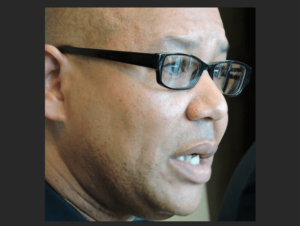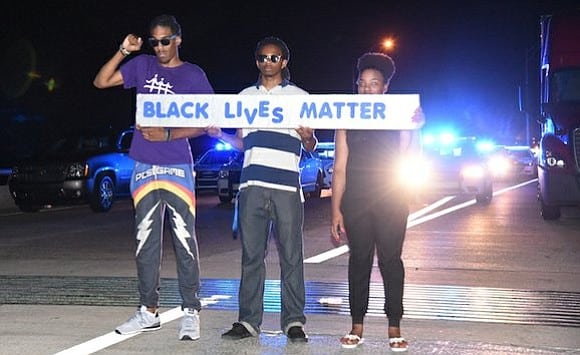An uptick in local demonstrations and protests, such as the one on the Interstate 40 Bridge in 2016, plus police ambushes that have left policemen dead across the country are two factors that prompted Memphis police to look for new ways to gather intelligence, according to Memphis Police Department Director Michael Rallings.
Rallings took the stand for a second day on Wednesday in a trial before U.S. District Judge Jon P. McCalla. The American Civil Liberties Union of Tennessee alleges that Memphis police used social media monitoring, undercover operatives and other means to monitor Black Lives Matter and other activist movements in violation of a 1978 consent decree.
The decree puts gathering “political intelligence” off limits to city government.

On Wednesday, Rallings recalled the events that led to activists shutting down the Interstate 40 Bridge. Rallings went out on the bridge and talked the protesters into returning to the FedExForum plaza – where the protest began – for a discussion of their grievances.
“Some of the people on the bridge were acting like it was one big party out there,” Rallings testified Wednesday. “…My biggest fear was that someone was going to fall off the bridge and that the protesters would say police pushed them.”
Rallings said using force would have been the wrong thing to do at the wrong time. He said the reaction from the crowd would have been worse than what happened in the 1960s when a civil rights march in Montgomery ended in a bloody clash between protesters and police.
Rallings said he was willing to talk with protestors for as long as it took to calm them down.
“I suggested we move to 201 Poplar, but they didn’t want that. Then I suggested the National Civil Rights Museum,” he said. “We finally ended up going back to the FedExForum.”
The protest ended without any arrests or injuries. But it was one of the reasons police opened a phony Facebook account and used undercover operatives in an attempt to sift through and assess the numerous threats and rumors that churn across the Internet like a virtual disaster waiting to happen, Rallings said.
Ursula Madden, chief communications officer for the city, said that while McCalla has already ruled that the MPD violated the consent decree, the city disagrees and believes police officers, “acted in good faith and for the right reasons.
“We maintain that we were in compliance with the consent decree and that everything the Memphis Police Department has done in terms of monitoring social media and how they have done it is in accordance with the best police practices around the country.”
Madden said the MPD is using standard operating procedure to make sure that when demonstrations take place everyone is kept safe.
“Not just the police department and not just the demonstrators but the public at large and I will add that…no one’s first amendment rights have been squelched,” she said. “All the demonstrations that were planned…were allowed to go forward, as long as no one was doing any criminal activity.”
On Tuesday, Rallings testified that for a long time he had little knowledge of the consent decree against political surveillance that’s at the center of the legal controversy.
The city government had reached a formal legal agreement, or consent decree, with a local branch of the American Civil Liberties Union not to gather intelligence on non-criminals.
Rallings joined the police department in 1990, became interim police director in early 2016 and officially became police director in August of 2016.
He said information about political surveillance and the 1978 consent decree is made available to police on a kiosk system available to all officers.
A police detective on Monday testified that he operated a fake Facebook account while posing as a man of color to glean information on protests and other events. It was done as part of The Real Time Center monitored by police to keep tabs on protests and on threats of violence associated with protests.
The ACLU of Tennessee says MPD has used social media monitoring, undercover officers and other tactics to monitor activists with Black Lives Matter and other groups, stifling rights to free speech and assembly.
The organization has asked for court-ordered monitoring of the Memphis Police Department and wants the department to give officers additional training on citizens’ rights, especially the right to protest and peacefully assemble.
The city says those steps aren’t necessary and wants to revise the 1978 consent decree or do away with it altogether. The department says the consent decree is outdated, given modern realities such as social media that can lead to fast-moving public events that can spiral out of control.
McCalla ruled Aug. 10 that the city had violated the 1978 consent decree. He is allowing the trial to go forward as he considers other issues. Among them is whether the city took part in actions that stopped people from exercising their rights to free speech and assembly.
The city government is trying to establish that the ACLU doesn’t have standing to sue because it wasn’t part of the 1978 consent decree.
Rallings on Tuesday testified that in 2014 he started drafting standing operating procedures, known as SOP, for rallies and marches that turn bad.
“We didn’t want to have another Ferguson, we didn’t want to have a Baltimore,” Rallings said. “It’s a draft, mainly because of the lawsuit, but we’ve adopted it as SOP.”
Rallings said it comes down to using a measured approach to dealing with hostile crowd situations.
“I preach to my commanders, ‘slow it down,’” he said.




